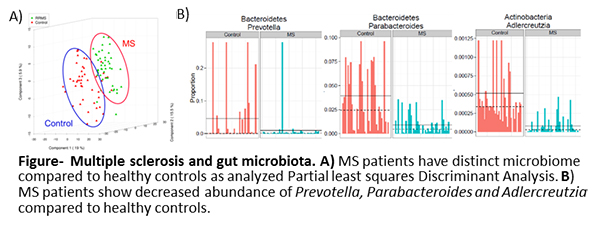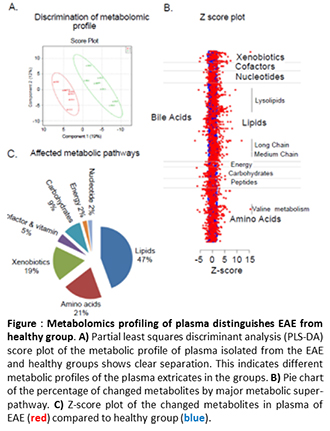Multiple sclerosis (MS) is an autoimmune inflammatory demyelinating disease of the central nervous system (CNS). The etiology of MS is complex and poorly understood. Both genetic and environmental factors play a role and recent evidence suggests that gut microbiota is one of the key environmental factors. A healthy human gut harbors a large number of bacteria (100 trillion), which play a central role in human health by regulating human physiology, metabolism, nutrition and immune system. Alteration in microbiota composition might be responsible for various inflammatory and autoimmune diseases including MS. Therefore, to understand role of microbiota in MS, we utilize cutting edge research to define the microbial community associated negatively (protective) or positively (pathogenic) with disease and test their functional significance utilizing in vivo and in vitro studies. A better understanding of the same will help in identification of pathogenic microbiota, therapeutic microbiota as well as potential diagnostic and prognostic biomarkers.
To define the gut microbiota of MS patients, we performed fecal microbiota analysis in MS patients and age and gender matched healthy controls. Phylotype profiles of the microbiome populations were generated using deep sequencing of the hyper variable V3-V5 region of the 16S ribosomal RNA (rRNA) gene and analyzed using a various microbiome analysis pipelines. We observed that MS patients and healthy control have distinct bacterial communities with MS patients showed higher abundance of Firmicutes phyla whereas control group showed higher abundance of Bacteroidetes, Actinobacteria and Proteobacteria. Our study has identified specific taxa which negatively and positively correlated with the disease or healthy state. In particular, our study is consistent with the hypothesis that microbial dysbiosis might be a contributing environmental factor in MS etiology. We are currently testing the physiological significance of these bacteria utilizing in-vitro and in-vivo studies.

Metabolomics profiling of plasma distinguishes disease from healthy state in animal model of MS
Host as well as microbiota derived metabolites can play a significant role in MS. Therefore, we are also performing fecal and plasma metabolic profile of MS patients and healthy control. In a collaborative study (Dr. Shailendra Giri), we profiled untargeted global metabolites in the plasma in chronic –EAE model (B6 mice) as well as relapsing remitting-EAE model (SJL mice) and have identified number of metabolites which are positively or negative associated with disease progression. Our studies suggests that metabolic changes could be exploited as (1) biomarkers for EAE/MS progression and (2) to design new treatment paradigms where metabolic interventions could be combined with present and experimental therapeutics to achieve better treatment of MS. Thus metabolic profiling in animal model supports our finding that microbiota based signature can be used to differentiate MS patients from healthy populations and might also lead to design/identification of novel therapeutic targets.
